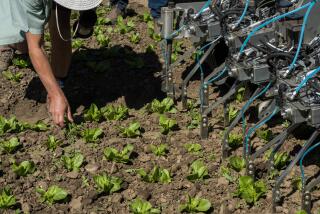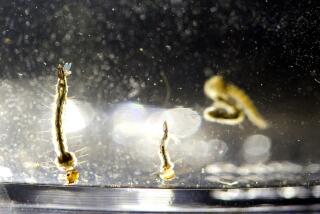Seed Companies Harvest Profits With Genetics
- Share via
DES MOINES — Until recently, seed companies were about as exciting to investors as weeds. The bucolic charms of corn ears and cotton bolls paled beside the allure of hard drives and the Pentium chip.
That’s changing.
After decades of gestation, plant biotechnology is emerging as a powerful force in the food chain, and the share prices of companies that stand to benefit are climbing.
“Agricultural biotechnology is at a point where its commercial realization is now, and not in the future anymore,” said Alex To, a Donaldson Lufkin & Jenrette analyst. “These companies are going through quite a significant transformation.”
At the forefront are creators of gene-altering technology such as St. Louis-based Monsanto Co. But right there with the gene developers are seed companies, which provide the medium through which the new technology will be delivered.
Des Moines, Iowa-based Pioneer Hi-Bred International Inc.; Dekalb Genetics Corp. of DeKalb, Ill.; and other seed producers that once succeeded or failed on their own merits now find their fortunes increasingly bound to biotechnology companies.
“The seed industry is being turned into a high technology business, with growing similarities to the computer hardware and software business,” said Sano Shimoda, president of BioScience Securities Inc., an Orinda, Calif.-based investment company. “Seeds in this case represent the hardware and genes the software.”
*
Last year the first commercially grown, genetically engineered crop--insect-resistant cotton--was planted on 1.8 million acres across the U.S. cotton belt. The seed, known as NuCotn, was developed by Scott, Miss.-based Delta & Pine Land Co. using a gene derived by Monsanto from a soil bacterium called Bacillus thuringiensis, or Bt.
This year, farmers will be able to buy insect-resistant corn, herbicide-resistant soybeans and new varieties of insect-resistant cotton. Within a few years, that list is expected to include virus-protected tomatoes, disease-resistant strawberries, high-oil corn and plants that produce biodegradable plastic polymers.
By the year 2010, analysts estimate, genetically engineered crops could generate $20 billion in annual revenue, up from virtually nothing today.
“The application of biotechnology to agriculture will rank on the commercial Richter scale alongside such major transforming technologies as the steam engine, transistor and computer,” Shimoda said.
Investors, sweeping aside years of disappointments and false dawns, seem to agree. Through late last month, Monsanto’s shares had risen 41% in the past year and shares of San Diego biotechnology company Mycogen Corp. were up 38%. Pioneer’s climbed 25% and Delta & Pine Land’s 28%, while Dekalb shares tripled, boosted in part by a long-term research agreement with Monsanto. All outpaced the S&P; 500 Index, which rose 24% in the same period.
Still, there are hurdles ahead for companies hoping to succeed in agricultural biotechnology. For one thing, the industry is still in its infancy.
“The products seem to be delivering, but just one year doesn’t cut it,” said Jonathon Braatz, an analyst at George K. Baum & Co. “You have to have success over a period of several years.”
*
Moreover, competitive pressure from chemical companies that make traditional insecticides could force Monsanto and others to cut the prices they charge farmers for their gene technology.
“I think it will be very interesting to see how the competitive interaction between the biotech and non-biotech products unfolds,” Braatz said. “These products are commanding pretty good premiums today, but will they exist four years from now?”
In addition to the cost of the seed itself, farmers must usually pay a licensing fee for the added technology. In the case of NuCotn, that fee is $32, which is divided between Monsanto and Delta & Pine Land Co., with Monsanto getting about 70%.
Over the long term, the winners in this industry will be companies with access to technology that can enhance the nutritional value of food or feed products, as well as access to the highest-quality seed lines through which to deliver those improvements.
Since no company has all these elements, the participants have begun forming alliances to try to get what they need.
Among the groupings are AgrEvo GmbH, a joint pesticide venture of German chemical companies Schering AG and Hoechst AG; DowElanco, a joint venture by Dow Chemical Co. and Eli Lilly & Co.; and Novartis AG, the company created in December through a $36-billion merger between Sandoz AG and Ciba-Geigy AG of Switzerland. Monsanto has a 40% stake in Dekalb Genetics.
More to Read
Inside the business of entertainment
The Wide Shot brings you news, analysis and insights on everything from streaming wars to production — and what it all means for the future.
You may occasionally receive promotional content from the Los Angeles Times.










